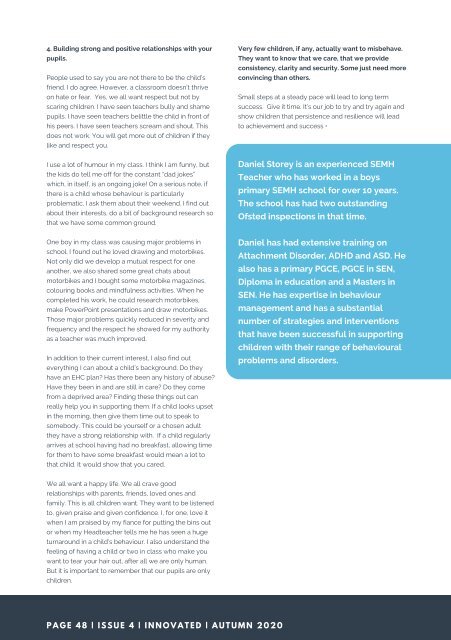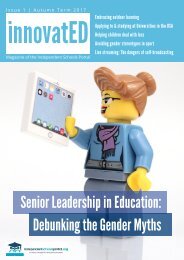innovatED Magazine - Issue 4 - Spring 2020
A mixture of news, opinion, research, ideas, great practice and regulatory updates. innovatED takes a global perspective and brings the latest educational developments from across the world onto your laptop, smartphone - and with the printed edition - into your staff room.
A mixture of news, opinion, research, ideas, great practice and regulatory updates. innovatED takes a global perspective and brings the latest educational developments from across the world onto your laptop, smartphone - and with the printed edition - into your staff room.
You also want an ePaper? Increase the reach of your titles
YUMPU automatically turns print PDFs into web optimized ePapers that Google loves.
4. Building strong and positive relationships with your<br />
pupils.<br />
People used to say you are not there to be the child’s<br />
friend. I do agree. However, a classroom doesn’t thrive<br />
on hate or fear. Yes, we all want respect but not by<br />
scaring children. I have seen teachers bully and shame<br />
pupils. I have seen teachers belittle the child in front of<br />
his peers. I have seen teachers scream and shout. This<br />
does not work. You will get more out of children if they<br />
like and respect you.<br />
I use a lot of humour in my class. I think I am funny, but<br />
the kids do tell me off for the constant “dad jokes”<br />
which, in itself, is an ongoing joke! On a serious note, if<br />
there is a child whose behaviour is particularly<br />
problematic, I ask them about their weekend. I find out<br />
about their interests, do a bit of background research so<br />
that we have some common ground.<br />
One boy in my class was causing major problems in<br />
school. I found out he loved drawing and motorbikes.<br />
Not only did we develop a mutual respect for one<br />
another, we also shared some great chats about<br />
motorbikes and I bought some motorbike magazines,<br />
colouring books and mindfulness activities. When he<br />
completed his work, he could research motorbikes,<br />
make PowerPoint presentations and draw motorbikes.<br />
Those major problems quickly reduced in severity and<br />
frequency and the respect he showed for my authority<br />
as a teacher was much improved.<br />
In addition to their current interest, I also find out<br />
everything I can about a child’s background. Do they<br />
have an EHC plan? Has there been any history of abuse?<br />
Have they been in and are still in care? Do they come<br />
from a deprived area? Finding these things out can<br />
really help you in supporting them. If a child looks upset<br />
in the morning, then give them time out to speak to<br />
somebody. This could be yourself or a chosen adult<br />
they have a strong relationship with. If a child regularly<br />
arrives at school having had no breakfast, allowing time<br />
for them to have some breakfast would mean a lot to<br />
that child. It would show that you cared.<br />
Very few children, if any, actually want to misbehave.<br />
They want to know that we care, that we provide<br />
consistency, clarity and security. Some just need more<br />
convincing than others.<br />
Small steps at a steady pace will lead to long term<br />
success. Give it time. It’s our job to try and try again and<br />
show children that persistence and resilience will lead<br />
to achievement and success •<br />
Daniel Storey is an experienced SEMH<br />
Teacher who has worked in a boys<br />
primary SEMH school for over 10 years.<br />
The school has had two outstanding<br />
Ofsted inspections in that time.<br />
Daniel has had extensive training on<br />
Attachment Disorder, ADHD and ASD. He<br />
also has a primary PGCE, PGCE in SEN,<br />
Diploma in education and a Masters in<br />
SEN. He has expertise in behaviour<br />
management and has a substantial<br />
number of strategies and interventions<br />
that have been successful in supporting<br />
children with their range of behavioural<br />
problems and disorders.<br />
We all want a happy life. We all crave good<br />
relationships with parents, friends, loved ones and<br />
family. This is all children want. They want to be listened<br />
to, given praise and given confidence. I, for one, love it<br />
when I am praised by my fiance for putting the bins out<br />
or when my Headteacher tells me he has seen a huge<br />
turnaround in a child’s behaviour. I also understand the<br />
feeling of having a child or two in class who make you<br />
want to tear your hair out, after all we are only human.<br />
But it is important to remember that our pupils are only<br />
children.<br />
P A G E 4 8 | I S S U E 4 | I N N O V A T E D | A U T U M N 2 0 2 0






